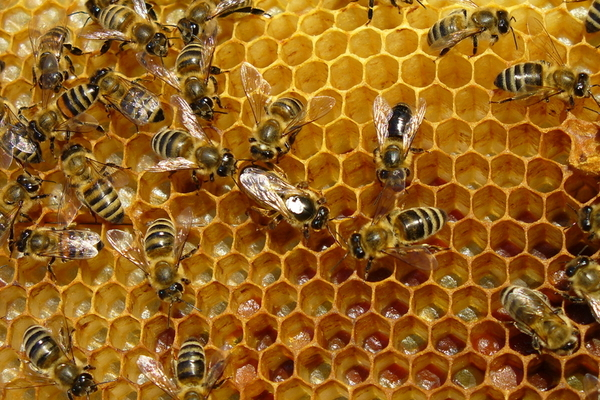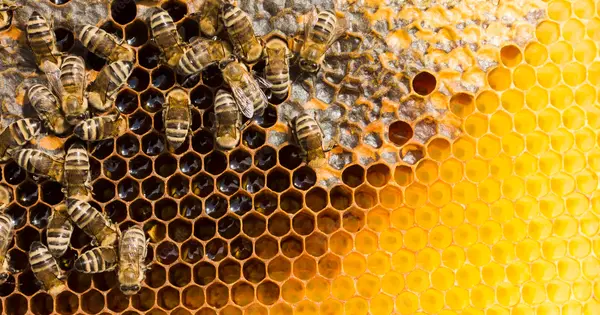Researchers discovered a bacterial microbe that, when fed to honey bee larvae, can reduce the effects of nutritional stress on developing bees. Researchers from Indiana University discovered a specific bacterial microbe that, when fed to honey bee larvae, can reduce the effects of nutritional stress on developing bees, which is one of the leading causes of honey bee decline. Their findings were recently published in the Journal of the International Society for Microbial Ecology.
Honey bees provide food security for humans. Honey bees are extremely useful for agriculture because they can pollinate almost anything. However, over the last few decades, the honey bee population has declined dramatically due to the effects of multiple stressors, the most prevalent of which is a lack of nutrition. According to a national survey, beekeepers in the United States lost 40.5 percent of their managed colonies between 2015 and 2016.
“The effects of poor nutrition are most damaging in developing honey bee larvae, who mature into workers unable to meet the needs of their colony,” said Irene Newton, the study’s lead author and professor in the IU Bloomington College of Arts and Sciences’ Department of Biology. “It is therefore critical that we better understand the nutritional landscape that honey bee larvae encounter.”
We discovered a nutritional symbiont of honey bees, a microbe that can help the bees cope with nutrient scarcity and stress. We saw a drop in mass for the bees when we limited bee nutrition during development; bees were much smaller than their control counterparts.
Irene Newton
According to Newton, honey bees require pollen and nectar from a variety of plants and flowers to keep their colonies healthy throughout the year. However, many bees in the United States lack this floral diversity.
“We’ve changed the way we use our land in the United States,” Newton explained. “We now have tons of monoculture crops, such as corn, that are wind-pollinated and thus useless to bees, covering acres and acres of land. Other crops that bees pollinate are also grown in monoculture, limiting bees’ options. It is unhealthy to restrict yourself to only one type of food. You must eat a diverse diet in order to meet all of your nutritional requirements. Bees behave similarly.”
Honey bee larvae are fed by their sister bees. Their diet consists of foraged ingredients such as nectar and pollen, as well as royal jelly — a bee glandular secretion that is complex and nutrient-rich. If larvae are destined to be queens, they will eat royal jelly their whole lives. If they are workers, their diets will shift to nectar and pollen after a few days.

In addition to being more nutritious than nectar and pollen, royal jelly has long been known to possess potent antimicrobial properties due to its acidity, viscosity, and the presence of antimicrobial peptides. This means that most microbes exposed to royal jelly die, Newton said.
Except one.
Newton and her colleagues discovered that a specific microbe, Bombella apis, is the only larva-associated bacterium that can thrive in royal jelly in their new study. They also discovered that B. apis makes royal jelly more nutritious by significantly increasing its amino acid content, which aids in the development of resilience against nutritional stress in developing bees.
“We discovered a nutritional symbiont of honey bees — a microbe that can help the bees cope with nutrient scarcity and stress,” Newton explained. “We saw a drop in mass for the bees when we limited bee nutrition during development; bees were much smaller than their control counterparts.”
“When B. apis was introduced into these same bees, despite their poor nutrition, they grew to the same size as control bees given full nutrition. The microbe compensated for the poor diet. This suggests that B. apis could be used as a probiotic in colonies to protect against nutritional stress.”
The findings indicate that B. apis has the potential to be an important supplement in future beekeepers’ efforts to counteract the negative impact of poor nutrition on honey bee health. Because B. apis can survive in sugar water for more than 24 hours, beekeepers who are already supplementing their colonies could potentially incorporate a B. apis probiotic into their bees’ diets.
This study builds on Newton and her colleagues’ previous research, which discovered that B. apis protects bees from fungal infections and is an important part of the queen gut microbiome.
“We are excited to investigate the other interactions that B. apis has in a colony, in order to better understand what it does in different environments and the role it plays in association with honey bee queens,” Newton said.





